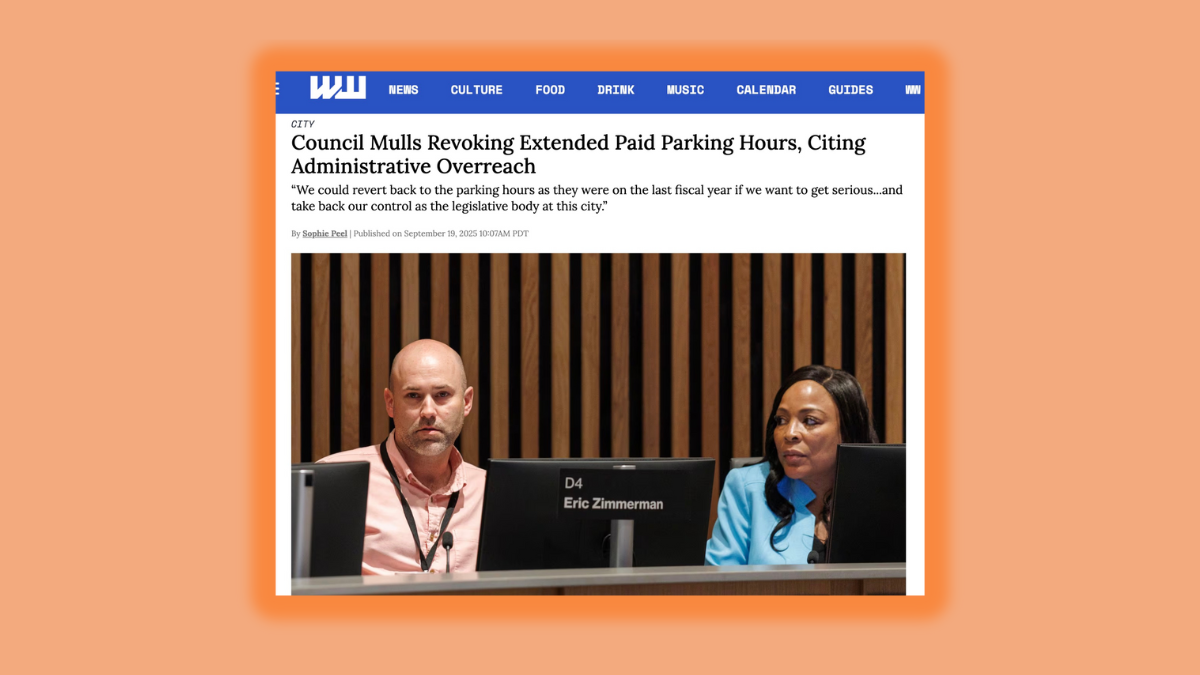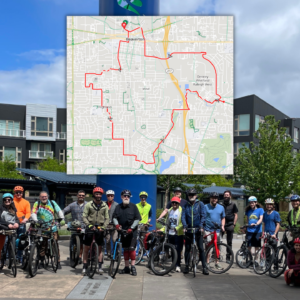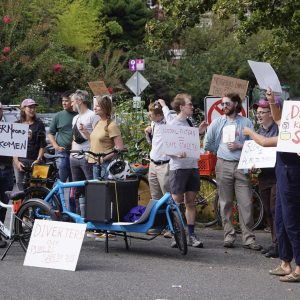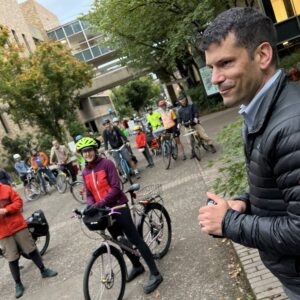
Another transportation-related policy change, made unilaterally by the city’s administrative wing, has rankled city council members.
According to the Willamette Week,
Members of council, led by Councilor Eric Zimmerman, said Wilson’s unilateral directive to extend the hours of paid parking from 7 to 10 pm in pockets of the city this summer—a move that has frustrated many Portlanders—is an overreach of Wilson’s administration.
“We could revert back to the paid parking hours as they were on the last fiscal year if we want to get serious,” Zimmerman pitched to his colleagues, “and take back our control as the legislative body at this city.”
An “overreach of Wilson’s administration”? Hmm, why does that sound familiar? Oh yeah, it’s just like how an office overseen by Mayor Wilson unilaterally decided to remove traffic diverters on two neighborhood greenways in Northwest Portland. In my coverage of that issue back in August, we learned that most members of city council hadn’t even heard about the plan. In fact, City Councilor Mitch Green was so peeved by this lack of consultation that he’s shared an intention to change city code so it won’t happen again.
Green pulled out a statute in Portland City Code that states, “City Council is the road authority for all public streets.” Then he told a city advisory committee that, “The city administrator is allowed to execute our vote. It’s inappropriate for the city administrator to pull back on investments they’ve made without at least notifying city council and asking for permission. That needs to change and that will change.”
On the paid parking issue, it looks like city councilors are split on the merits of the policy, but united in concern over how it was implemented.
On a related note, I can’t help but notice the hypocrisy here from Councilor Zimmerman. He’s concerned about administrative overreach when it impacts a policy he dislikes (paid car parking), but he didn’t speak up when it impacted a policy he likes (removing the diverters).
The Willamette Week story makes it clear that even City Administrator Mike Jordan isn’t sure who has ultimate authority over transportation decisions. Seems like this is an issue we need to rectify immediately. Either that, or maybe the mayor and other administrative office staff should do a bit more outreach to their colleagues before moving forward with major policy changes.







Thanks for reading.
BikePortland has served this community with independent community journalism since 2005. We rely on subscriptions from readers like you to survive. Your financial support is vital in keeping this valuable resource alive and well.
Please subscribe today to strengthen and expand our work.
Micromanagement by the elected city council versus administrative overreach by the city administrator?
Democracy versus efficiency?
Public process versus authoritarianism?
Transparency and open government versus your tax dollars at work?
Portland: A City That Wants It Both Ways.
No, Zimmerman wants it both ways (and sometimes Clark, who supported diverter removal). Voters wanted council to pass the laws and mayor’s office to see they were enacted. We were sick of The Wheeler Way of mayoral back-room fixes.
You are capable of great insights when you want to, but you seem to have taken up trolling as a hobby… pity.
The form of government that Portland voters chose to implement is specifically designed and tailored for back-room dealmaking, as any other city with a similar form of government can tell you – y’all chose the most opaque black-box type of government whereby most power is now in the hands of the bureaucracy and the mayor – yet y’all chose it because y’all thought it would be the most efficient. And it is efficient, extremely, none more so. By eliminating most public debate, aside from 12 elected city councilors, y’all have implemented what most mayors come to expect from their cities – a mayor-appointed city-administrator run bureaucracy that pretty much just answers to the mayor. If y’all had wanted a more open transparent form of government, y’all would have left the previous sloppy and imperfect bureaucracy run by amateur elected officials alone and simply changed the way you elect your city councilor administrators.
David, your observations about the Portland city gov’t you remember bear all of the hallmarks of rosy retrospection.
You had probably already been gone for a while when city councilors / bureau commissioners so abused their positions that they singlehandedly dismantled the agencies they were assigned to run. The ensuing chaos was intolerable for bureau employees and Portland city-zens alike. The folly of electing someone who knew nothing about transportation, water, etc and putting her/him in charge of professionals was never clearer.
So the city structure simply had to change. Is the new system perfect? Certainly not, and it’s going to take some time to work out the details. I partiularly dislike having THREE reps to keep track of, and the type of multivoting seems opaque and confusing. But overall I feel as though we’re in a better place than we were.
Having 12 representatives rather than just 5, and electing them by district and by ranked-choice are huge improvements. If y’all went one step further and directly elected your bureau directors to council (which some European cities actually do), you would have been better off yet.
During the 17 years I lived in Portland (1997-2015) there were plenty of scandalously bad city councilors who knew nothing and even less after being in office; there were also some truly outstanding city councilors who could be relied on to run any bureau well and efficiently.
Most US cities are run a lot like Portland’s new form of government, including the city I currently live in – or rather, they are run just as badly if not worse, and my current community is a case in point.
Lol, in my conversations with people i don’t think people had much of an idea what they were voting for other than change.
Portland voters naively believed that the CoP executive class is chomping at the bit to Leslie Knope their way into a progressive utopia when in reality upper-level city bureaucrats are regressive, reactionary, and obsequious to the interests of the rich.
It’s like the final few pages of “Animal Farm” come to life.
The activist leaders become the new politburo while the downtrodden workers keep on being downtrodden workers and the bureaucracy grinds on uninhibited. Total progress.
Not sure why you are commenting about the takeover of US federal government by fascist activists in response to my comment.
“Portland (American) voters naively believed that the CoP (MAGA) executive class is chomping at the bit to Leslie Knope (Ron Swanson) their way into a progressive (totalitarian) utopia when in reality upper-level city (national) bureaucrats are regressive, reactionary, and obsequious to the interests of the rich.”
Lol, because it only takes a few word changes to have the same argument against the left as it does the right.
When the left and the right have gone so far in their respective directions they have arrived at the same place and are instigating for the same results, where does that leave the middle?
In my opinion, only someone sympathetic to fascism would argue that boring centrist/center-left “progressives” are anywhere near as corrosively violent and destructive as fascists.
Oh, I’m arguing the left in Portland are the fascists in deed and the far left and far right nationally are fascists as well. Who in the world shuts down public discourse, breaks business windows, torches and pulls down statues, shuts down streets and attacks people in their cars, vandalizes and steals from Indigenous museums, burns buildings with people in them, spreads graffiti everywhere and leaves toxic needles in playgrounds (and all over)? Pretty sure that’s the Portland left. Compare that to those wicked Proud Boys who drove around in obnoxious, stinking trucks and shot at people with paint balls. I recall a leftist committing political murder in Portland. I can’t recall a rightist committing political murder lately, but if you can I’d be glad to hear of it.
Jake9:
Oh-so-mid portland progressives are, of course, well-known agitators who attack people and vandalize indigenous museums. I am also very politically confused. /s
Not exactly – Wheeler set a lot of the city hall infrastructure in stone before the council was seated, to prevent too much power shifting to elected ‘radicals.’ And his assignment of Jordan to city manager is akin to Chales the First telling Cromwell “this guy Villiers is cool; he’s sticking around to help you out!” Council now has an opportunity to hire a city manager who will respect their authoriy, if they’re smart.
As far as claiming the old system where a few amateurs tried to run complex systems (all the while focussed on getting reelected, or being an asshat gadfly like Randy Leonard) was better and just needing tweaking… that’s just nuts. I’m going to tell your boss they should switch you from your current desk and send you over to run the water department; no training. Then maybe send you to Fire next year!
That’s what we had before. Great way for the mayor to play power games but a shitty way to run a modern city.
Zimmerman is abusing his position to attack bureaus he has a grudge against; Avalos is just a tiktokker with a n office. With luck they both loose next cycle. Bumps in road are expected, but I’d rather have 12 people getting lost and arguing about direction than a single driver heading us off a cliff.
Who wants it both ways? These two councilors want it a certain way.
I think the following excerpt from the Oregonian’s editorial this morning is relevant:
“While the broader, diverse representation gives more Portlanders a place at the table — a key goal of the charter change — the slow progress and hours-long rehashing of procedural details send a discouraging message about the city’s ability to confront the crises Portlanders are facing every day.”
Ref: https://www.oregonlive.com/opinion/2025/09/editorial-pull-it-together-portland-city-council.html
After living in Portland for more than 40 years, I’ve seen both good and bad city governance. Right now, echoing the editorial, I think our council is floundering. Professionally, I spent much of my career designing processes for IT systems and the related human workflows. When I think of the council as implementing a new, large, complex system, I can appreciate what they’re up against. That said, I also recall times when I got caught up in process-for-process’s-sake activities, creating workflows that were overly complicated, losing sight of primary objectives, and so on. I fear the council has reached that same point.
Putting aside my “The City that Works” criticism, my biggest frustration over the past decade has been with Multnomah County. I won’t elaborate, except to say that my wife and I are finally taking steps to relocate out of the county. We’re not yet sure whether we’ll move to Washington, Clackamas, or Clark County, but after spending the day walking around Beaverton and Hillsboro yesterday to get street-level views, much of what I saw was refreshing.
Apologies for the duplicate text. My edits failed after the initial post. I think they timed out, but I’m not sure what the edit window is.
Jonathan – I asked you to post the correct version via email.
You spun the “edit” wheel just a touch too hard 🙂
Happens to us all.
Yep. I suppose if Jonathan leaves my redundant text above, folks can see my line of thinking and intentions. I’ll miss our house (with 40 years of blood, sweat, and tears), but I’m at the point where I don’t think I’ll miss Multnomah County. Walking around Beaverton and Hillsboro yesterday just reinforced our decision, and as I mentioned in my album description, I’m looking forward to more walks in Washington, Clackamas, and maybe even Clark County. We have family and friends in those places, so we’re also paying attention to their day-to-day lives. And just to be clear, I’m not starry-eyed about “greener pastures.” Every county has its issues.
You seem to have missed the part about what the city code says.
And, your “versus” points are ridiculously mangled. The comment section in Willamette Week articles is where you go to post snark.
I came here to make a point similar to David’s, but I would want the city council to take a more nuanced approach and pass more broad-based ordinances and resolutions that the city administrators then carry out. I’m not sure I want my councilors wrangling over whether parking is charged from 7 to 10pm or 6 to 8pm. Instead the council should provide broader guidance about balancing revenue generation and livability, and let the administrator work out the exact details.
David is right: the council trying to micromanage every aspect of city gov’t is doomed to failure, so getting the balance right is critical. Fortunately this infant gov’t has many other examples to look to – Portland isn’t unique, though we like to think we are.
That was my fear when the system changed, that once budget got approved, city officials will just do whatever they wanted with no oversight.
Jonathan — you’ve tied yourself in a real pretzel here, mate.
You’re fumin’ about overreach when they ripped out the diverters (fair enough), but now that the admin pulls a sneaky on paid parking, your outrage does a vanishing act and suddenly it’s Zimmerman’s fault for noticing?
Bit rich, don’t you think? Can’t just swing the “process integrity” stick only when it whacks the policies you like. That’s not journalism — that’s just riding the bike lane fence in both directions.
Pick a lane, Mr Maus.
Hi Angus,
Contrary to your comment, the article draws parallels between the diverter scandal and the lack of council input on the paid parking hours change. Here is the closing statement of the piece:
How do you conclude that Jonathan is ‘swing[ing] the “process integrity” stick’ only for his priorities? Good debate requires a bit of generosity for your interlocutors to provide space for competing arguments to be considered. Your comments on BP frequently do raise legitimate considerations that do not occur spontaneously to me, and I enjoy reading them for that reason. I feel like this comment is a little unfair.
Cheers,
Micah
What are you talking about Angus? Seriously your bias about me really seems to prevent you from having good comprehension of what I write. This isn’t about me and what I think. I’m pointing out the double standard from Zimmerman and trying to make some points and share information I think the community should know about. I also think that an unbiased reading of my post would allow you to see that I am indeed concerned in general about administrative overreach, regardless of the issue.
This isn’t really about who makes policy. That’s an excuse Zimmerman is putting on.
This is about people frustrated that they can’t store their car in about 200 sq ft of valuable public space for free. We don’t really allow people to store anything else that large in public space for free. People are used to having their car ownership subsidized by the city, so they’re frustrated when they have to pay a few dollars to store in a few places in the city.
The council shouldn’t micromanage this level of decision.
I agree with you that car storage on public spaces can and indeed should be monetized (although it’s been an issue lately about where that money goes and if it actually helps do anything positive)and would need to be applied to everyone, including indigent people which I can’t imagine the council would do. However, saying that…
“We don’t really allow people to store anything else that large in public space for free”
is not quite accurate seeing some of the tent structures and collections of tents that are set up on public throughfares and indeed everywhere. If we are discussing simply the space taken up, then it sounds like you are also saying the city should be charging for and collecting money from the houseless.
Also, not sure where the 200 square feet came from unless it just sounded good. Looks like a compact parking space is between 120 and 144 square feet and a standard parking space is between 153 and 180 square feet.
Standard Parking Space Size (U.S.)Most standard parking spaces are designed to accommodate 90% of passenger vehicles on the road today.
Parking Type Width (feet) Length (feet)
Standard Car- 8.5–9 ft 18–20 ft- Most common in lots and garages
Compact Car-7.5–8.5 ft 16–17 ft- Common in urban/limited-space areas
Accessible (ADA)- 8 ft + 5 ft aisle 18 ft- Extra space for mobility device access
Parallel Parking- 8 ft 22–26ft- Longer for ease of entry/exit
Truck/Oversized-10–12 ft 20–30ft- Found in industrial or large-vehicle zones
Once upon a time, long long ago, ever so long ago, I had a job at PBOT. The team I worked with would go around and record and measure and map EVERYTHING in the public right-of-way downtown. There was a lot stuff and things to measure. 47+ types of signs (and 8 types of materials, we had a whole guide book on it), streetlights, 9 general types of bike racks, at least 5 major types of trash containers, corner ramps, sign boards, tiny little steel discs on the sidewalks designed for temporary loading signs, benches, and so on. We also measured the parking lines in the street, they varied a lot, from 18 to 25 feet between lines for car parking spaces, and MUCH longer for loading zone spaces, up to 60 feet.
For most cities, 7′ x 20′ is considered a “standard” onstreet parallel parking space (7×20=140 sq ft) but there’s always some extra space at the end for cars to get in and out, and some cities paint a “parking lane” line for 4 extra inches, so 200 sq ft would yield 7.33 ft x 27 ft or so, 7 or 8 spots per 180 ft Portland block (200 – 10 feet on each side for sidewalks), which sounds plausible.
Among the camps and chop shops and the stuff listed above, there are also cell towers, overhead walkways in East Portland and downtown, a “Village Inn” sign on Stark, speed and intersection cameras, power lines, trees, shrubbery, rail lines, crosswalks, bike lanes, and planted in many sidewalks, privately-owned telephone poles.
I do appreciate your real world observations and remembrances. I work in a public works and we have a serious issue with lost knowledge and awareness from even the last few decades. Any records that actually are preserved frequently don’t survive the next technological upgrade and so are lost and pretty soon only memories remain with no proof and once those people leave there aren’t even the memories. I remember you writing about the original CoP engineering drawings you dealt with and that seemed amazing. Do you remember what the parking dimensions are for standard, non parallel parking?
It depends. For public parking in a multi-level parking garage, I think it was 9 feet wide and 18 feet deep, but you could go narrower than that for public surface lots and even down to 7 feet wide for private valet parking. (This stuff I didn’t learn from PBOT but rather from the PSU director of facilities in 2002.) Multi-level parking garages are apparently considered the Roman Coliseums of the modern era – if you can design a multi-level parking garage that is safe, efficient, ADA, well-lit, and cost-effective, you can pretty much design anything else well – but most multi-level parking garages are unsafe, poorly built, dark, non-ADA, and god-awful ugly. Back in 2002 when I took a design course from that same PSU facility director (he was good!), the cost of a surface lot was $14,000 per car space, $34,000/space for a multi-level parking garage car space, and $30,000-$50,000 per street parking space in an urban area with vaulted sidewalks, underground waste disposal, sewers, water lines, etc. (but not on a suburban street, which are a lot cheaper, around $12,000/space). I’m sure those rates have gone up considerably since then.
And why is storing a bike for free okay?
That’s a fair point that I was trying to make with the houseless example. If the city is entering a stage where nothing is free anymore than anybody and anything is able to be charged for using public space. Bike racks, car parking, houseless encampments, whatever not already directly owned by the city (technically the taxpayer, but that ideal has gone away) can be charged a fee and maybe should be.
What’s the size limit then?
One thing lost in all of this jawboning is what the actual issue is: what is a city priority, and who gets to decide it, and/or the details of implementing it?
Zimmerman campaigned on focusing exclusively on revitalizing downtown; everything else to him (except gutting Urban Forestry, of course!) isn’t as important. This is why he seeks to eliminate things like diverters, street closures, bike lanes, etc downtown – he views them as attractive to drug users and homeless, and impediments to drivers, to paking, to business. In his mind, an increase in parking fee hours that may deter people from returning and patronizing downtown businesses is bad. Whether he is correct or not on that topic, he is right that a decision like this, which might have effects counter to other city priorities, is something that should have been discussed with council before a bureau annonces it. Perhaps they did, or did, but not with Eric. In any event, it isn’t micromanaging (because I know a few posters here who will instantly yell it) to have a bureau vet a process that may affect other priorities. It’s what they did before the change.
The problem is that Zimmerman approves of deciding what is a priority in quasi-public back rooms, but only if they are HIS quasi-public back rooms. If Zimmerman wants to sandbag various other priorities in his downtown efforts, it should be fair game for someone else to sandbag him, right?
Of course the solution is to have neither – councilors shouldn’t be able to twist the process to cut out certain players. Certain players shouldn’t cut out council. Wilson, Jordan and Zimmerman should have brought diverter removal before the full council, and bureaus should alert council of majotr changes and why they wish to do so (yes, this is a major change). Hourly rates are debated, and this should have been as well.
“Wilson, Jordan and Zimmerman should have brought diverter removal before the full council”
Council should not be deciding about whether or how to implement individual street projects — that’s simply not their role.
They should be deciding what policies they want PBOT and the mayor to follow when making those decisions.
No, you miss the point – the removal is widely seen as a quid pro quo to get downtown shelters put in; if Wilson thought the need of a shelter outweighed the need for the diverters, he was welcome to bring it before council and make the pitch; instead, he, Jordan and Zimmeerman worked behind the scenes to reverse a years-long, vetted and paid-for project.
And yes, council’s role is to debate individual street projects, because it funds PBOT programs that build them. PBOT can’t build anything like NWIM without a vote and funding from council. Maybe the new system will change that, but I spent a lot of time listening to council debate PBOT projects over the last decade!
ANd PBOT and Alternative Review made it an unwritten law that SW gets no sidewalks – this council voted to force PBOT to do that and began seeking ways to fund it. PBOT would NOT have budged unless council forced them.
This seems so easy to me.
Has the mayor violated city policy? If yes, hold him to account. If no, let it go, or change the policy.
Either way, council should be creating policies that are clear and implementable, and otherwise be staying out of the mayor’s way. Everything else is just grandstanding and micromanaging.